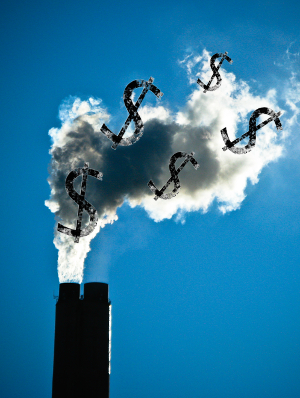Shell boss backs carbon price, a bit
 Shell's global chief executive says the world needs to put a price on carbon.
Shell's global chief executive says the world needs to put a price on carbon.
Shell boss Ben van Beurden says it is necessary to discourage pollution.
“Putting, in one form or another, a real, clear price on carbon that compels people to act with rational economic actions, I think is something that we need,” he told ABC reporters on the weekend.
He was asked about the Australian Government’s Direct Action plan - which pays for programs to cut emissions but does not charge heavy emitters - and said the design of carbon systems was a matter for politicians.
“Ultimately it doesn't matter too much if you have a trading system, a tax system or another system, as long as it is effective at what it does,” Mr van Beurden said.
Shell has backed its stance by joining forces with other global energy producers and industrial firms on the Commission of Energy Transition – a big new business lobby.
The group includes Australian mining giant BHP Billiton – which has major interests in coal, gas and oil - as well as Dow Chemical and General Electric - two major energy consumers.
The commission says it will provide advice to governments about how to combat climate change without damaging their economies.
But environmental science groups like Carbon Tracker have responded with scepticism.
Carbon Tracker researchers say the Commission of Energy Transition’s first report - which sought ways of lowering the use of fossil fuels to 50 per cent of energy production by 2050 - would leave the world open to global warming that is twice the level of the current international target.
“We question the credibility and independence of an Energy Transitions Commission funded by fossil fuel incumbents,” a statement from Carbon Tracker's chief executive Anthony Hobley said.
“Shell's track record on climate change does not inspire us with confidence and plans that would see half our power generated by fossil fuels in 2050 risk seeing us go way over the UN's 2 degrees Celsius climate change target.”
But Mr van Beurden said heavy polluting industries must be involved.
“The debate has gone to a place where some of the realism that we can bring to it has gone missing,”:he said.
Meanwhile, Shell is facing a battle for approval of its takeover of BG Group and the Arrow LNG project in central Queensland.
The Australian Competition and Consumer Commission (ACCC) is concerned that the project will lower competition and raise domestic gas prices.
There is speculation that the regulator will require Shell to set aside a large portion of its gas reserves for domestic use.
Mr van Beurden says the company must be allowed to export.
“It's going to be obvious in order to drive real scale in that project we will need to have access to export markets,” he said.
“The original plan was to build our own LNG plant. It may well be that we end up selling gas to other neighbouring LNG facilities so ultimately, and this is also what the ACCC has recognised, Arrow to be developed as a resource base does need the underpinning of an export project, whether it’s our own, whether it is somebody else's, whether it is somebody else's in which we have a share, is to some extent immaterial.”







 Print
Print